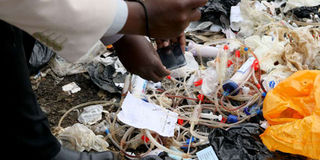Counties grapple with rising cases of medical waste

Dangerous medical waste discarded at a Nakuru dumpsite. Most counties in the North Rift are struggling to dispose of waste from hospitals as devolved units have not been allocated money to buy incinerators. PHOTO | BARACK ODUOR | NATION MEDIA GROUP
What you need to know:
The waste comprises up to 25 per cent hazardous material — which can be infectious and can cause injuries.
Categories of waste produced by health facilities include infectious, pathological, sharps, pharmaceutical, radioactive, pressured containers, chemical waste and heavy metals.
In Marsabit County, there is no incinerator. All sub county hospitals rely on burning chambers.
Careless disposal of medical waste is a posing a grave risk to Kenyans across the country.
The waste, mostly from private hospitals and clinics which do not have incinerators, is being dumped in the open in total disregard of national guidelines.
Even public health facilities at the lower level are affected, as only big hospitals have proper disposal facilities.
The waste comprises up to 25 per cent hazardous material — which can be infectious and can cause injuries.
According to the World Health Organisation (WHO), contaminated syringes were responsible for up to 33,800 new HIV infections, 1.7 million hepatitis B infections and 315,000 hepatitis C infections worldwide in 2010.
HEAVY METALS
Categories of waste produced by health facilities include infectious, pathological, sharps, pharmaceutical, radioactive, genotoxic/cytotoxic, non-infectious, pressured containers, chemical waste and heavy metals.
In Nyeri, private hospitals have been accused of dumping medical waste at the Asian quarters dumpsite in town, risking the lives of nearby residents. The waste includes used cotton wool, syringes, needles and bottles containing drugs.
County director of health Nelson Mureu said the Nyeri Referral Hospital has an incinerator for combusting waste, refuting claims that it was responsible for dumping.
“Our attention has been drawn to the hospital waste at the site, but private clinics and other hospitals are responsible for that,” he said.
He said the government would install a microwave that can sterilise and shred waste from all hospitals in the county.
“We are finalising that process. Once installed, there will be collection centres across the county. A lorry will collect the waste and bring it for sterilisation and shredding. The waste will then be safe for disposal like general waste,” Mr Mureu said.
HEALTH HAZARD
In Murang’a, private health facilities are also on the spot for dumping waste along the roads.
A month ago, medical waste was found dumped in a trench near Murari River in Murang’a town, posing a health hazard to residents and users of the water.
It included used syringes, gloves and documents showing patients’ details. On perusing the documents, the residents identified the source of the waste and called the proprietor of the medical facility.
The owner of the private clinic blamed the dumping on internal wrangles. He then carted the waste to Murang’a County Referral Hospital for incineration. Residents say it was not the first time they had found medical waste dumped there.
“We have enough incinerators in the county, and a modern one in Maragua which burns the waste at 600 degrees. Each private hospital is advised to take its waste there for disposal at a fee,” said Health and Sanitation executive member Joseph Mbai.
INCINERATOR
In Marsabit County, there is no incinerator. All sub county hospitals rely on burning chambers.
Laisamis Sub County Hospital CEO Abshiro Hapicha said there were plans to install an incinerator at Marsabit Referral Hospital.
“We use burning chambers to dispose waste in our hospitals. These chambers also serve the private clinics in town,” said Mr Hapicha.
In Meru, Kanyakine Sub County Hospital, which serves one of the most populous areas of the county, transports its waste to Meru town for incineration. Dr Charles Mulwa, the medical officer of health, said the hospital uses an open pit to burn general waste while hazardous waste is transported to Meru Referral Hospital for incineration.
WASTE DISPOSAL
According to Dr Cyprian Thiakunu, the proprietor of Nyambene Nursing Home, every health facility is required to have a standard incinerator, or have a contract with another hospital for waste disposal.
“Every health facility should adhere to Ministry of Health and WHO standards in medical waste disposal. Hazardous medical waste such us needles and syringes should be burnt in incinerators that reduce them to ashes,” Dr Thiakunu said.
The national guidelines for safe management of healthcare waste state that every facility must have a proper health care waste management plan — including packaging, segregation, labelling, transportation, storage, tracking, treatment and disposal.
The guidelines state: “Healthcare waste should be treated prior to disposal to ensure protection from the potential hazards posed. To be effective, treatment must reduce or eliminate the risk present in the waste, so that it no longer poses a hazard to persons who may be exposed to it.’
Reports by Irene Mugo, David Mchui, Irene Mwendwa, Ndingu Gachane, Angela Oketch, Barack Oduor, Eric Matara, Diana Mutheu and Kalume Kazungu




